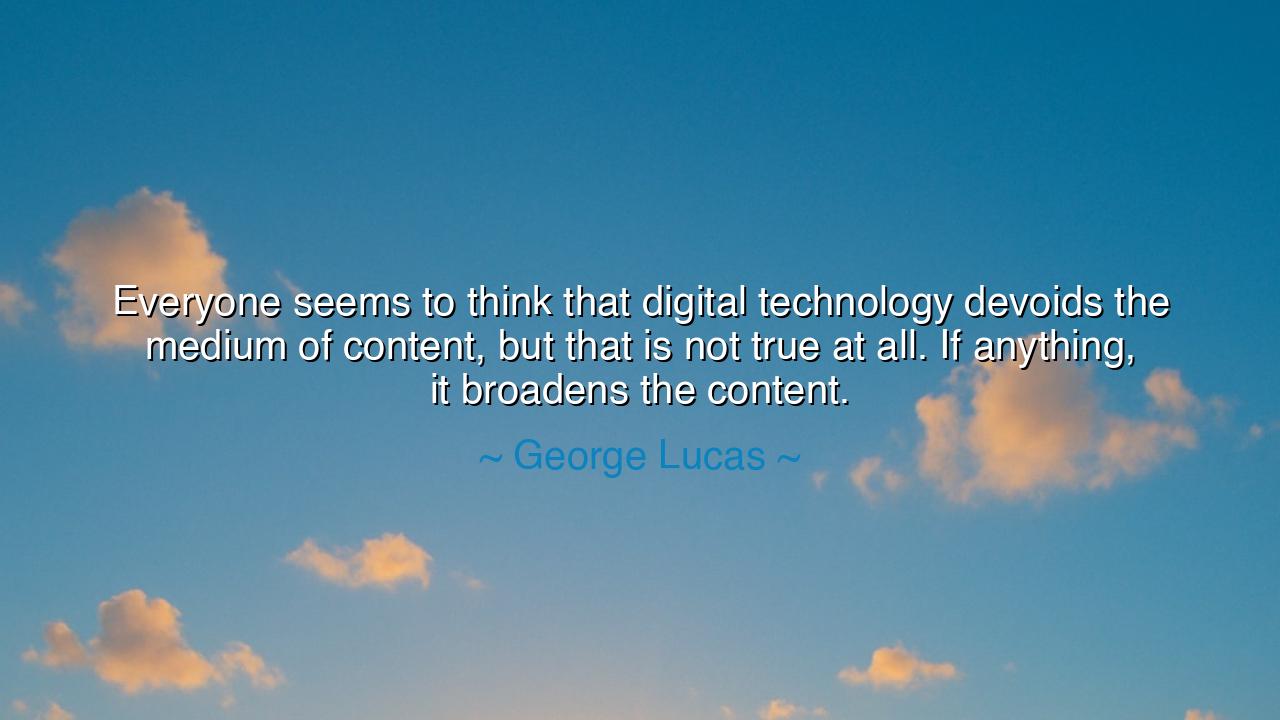
Everyone seems to think that digital technology devoids the
Everyone seems to think that digital technology devoids the medium of content, but that is not true at all. If anything, it broadens the content.






The words of George Lucas—“Everyone seems to think that digital technology devoids the medium of content, but that is not true at all. If anything, it broadens the content”—resound like the defense of a craftsman misunderstood by his age. Many fear that digital technology strips away meaning, that in its mechanical precision it hollows out the soul of art. Yet Lucas, a visionary who wove galaxies from light and sound, tells us that this is a false fear. Technology does not impoverish; it expands. It opens doors to new forms of expression, new textures of imagination, new ways for the human spirit to speak through image and sound.
The origin of these words lies in Lucas’s own battle as a filmmaker. He was among the first to embrace digital cinema, to champion computer-generated imagery, and to insist that storytelling need not be bound by the limits of traditional tools. Critics accused him of forsaking content for spectacle, of surrendering art to machines. Yet Lucas saw differently: the medium of film had always evolved—from silent pictures to sound, from black-and-white to color, from practical sets to visual effects. Each transformation did not destroy content but gave it new wings. His films, like Star Wars, proved that digital tools could carry myth, morality, and human drama to a scale never before imagined.
Consider also the story of Johannes Gutenberg and the printing press. In his time, there were those who claimed that printing would cheapen knowledge, that sacred texts would lose reverence when multiplied. But the press did not void content—it broadened it. Ideas once chained to monasteries spread to villages, cities, and nations. Revolutions were born, not because content was diminished, but because it was multiplied and enriched by accessibility. Just as the press expanded the written word, so does digital technology expand the languages of film, art, and human communication.
Lucas’s wisdom reminds us that tools are only extensions of the human will. A brush does not paint by itself; a pen does not compose by itself; nor does a digital camera tell a story by itself. It is the human heart that provides the vision, and the tool simply enlarges the possibilities. To say that technology destroys content is to mistrust the very creativity that gave birth to the technology. The truth is the opposite: the better the tools, the greater the reach of human imagination, provided the spirit behind them is noble and intentional.
And yet, there is a warning here, though unstated. If digital technology is empty, it is not the fault of the tool but of the craftsman. A painter with the finest brush can still produce emptiness; a director with limitless effects can still create hollowness. The responsibility is with the creator, not the medium. Lucas challenges artists to rise above fear and laziness, to use digital tools not as a crutch but as a canvas, to expand the depth and richness of their content rather than to replace it.
The lesson, then, is clear: do not fear new mediums. Whether in film, art, literature, or life, do not cling to the old tools as if they alone can carry meaning. Welcome the new, and bend it to the service of truth and beauty. Ask not, will this tool cheapen the message? but rather, how can this tool carry the message further, deeper, broader than before? To reject technology is to shrink the stage upon which the human story can be told. To embrace it with wisdom is to broaden the stage until the stars themselves become the backdrop.
In practice, this means embracing digital technology as a servant, not a master. Use it to tell deeper stories, to connect with more people, to preserve traditions even while innovating new ones. Let it carry education to the distant, let it amplify the voices of the unheard, let it reveal wonders of imagination and knowledge. For as Lucas teaches, technology broadens content—but only when we fill it with the courage of vision.
So let his words echo in our hearts: do not fear the digital age. It is not a thief of meaning but a vessel for greater meaning. Just as the printing press multiplied wisdom, just as film gave breath to stories, so digital technology can magnify the voice of humanity. The duty lies with us—to create with depth, to imagine with purpose, to wield the tools of our time not to hollow out our message, but to broaden it until it embraces the world.






AAdministratorAdministrator
Welcome, honored guests. Please leave a comment, we will respond soon